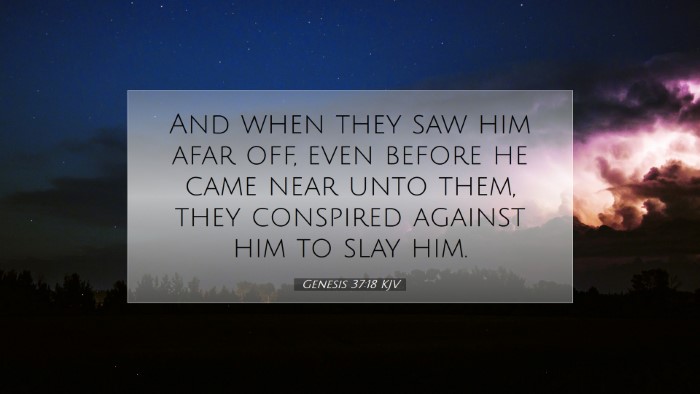Bible Commentary on Genesis 37:18
Verse Reference: Genesis 37:18 - "And when they saw him afar off, even before he came near unto them, they conspired against him to slay him."
Introduction
This verse marks a pivotal moment in the narrative of Joseph, which carries significant theological and moral implications. The dynamics within Joseph's family, particularly the escalating tension between him and his brothers, serve a greater purpose in the unfolding story of God's providence and human choice.
Contextual Background
Joseph is introduced in the Book of Genesis as the favored son of Jacob, which naturally breeds resentment among his brothers. This resentment is further exacerbated by Joseph's dreams, which suggest his future superiority over his family.
According to Matthew Henry, Joseph's coat of many colors symbolizes not just favoritism but also God's favor resting upon him. Albert Barnes reminds readers that familial strife often reflects deeper issues of jealousy and ambition, leaving a trail of devastation.
The Significance of 'Seeing Him Afar Off'
The act of seeing Joseph from a distance is laden with meaning. Adam Clarke suggests that this distance symbolizes the emotional and spiritual distance the brothers have from Joseph. Their recognition of him, even from afar, indicates their internal acknowledgment of their grievances against him.
This aspect of sight also foreshadows their intent to act against him. Matthew Henry comments that the sighting of Joseph is a moment of realization that escalates their premeditated plans into action.
Conspiracy to Slay
The phrase "conspired against him to slay him" reveals the depths of their hostility. In the eyes of Albert Barnes, this conspiracy represents the culmination of envy and hatred. The brothers are not just disgruntled; they are willing to commit fratricide. This stark reality poses ethical and moral questions about the nature of jealousy and hatred.
Furthermore, Matthew Henry notes that this moment is pivotal for understanding the nature of human sinfulness. The brothers' conspiracy acts as a microcosm for broader human vices—betrayal, anger, and violence can resonate deeply within any community. Their sin paves the way for the future events and the divine purpose that follows.
Theological Implications
The theological underpinnings in Genesis 37:18 reflect God’s sovereignty amidst human sin. While the brothers act out of malice, Adam Clarke emphasizes that their actions unknowingly set into motion God's plan to elevate Joseph. This serves as a reminder that human intentions do not thwart divine providence.
As the story unfolds, it is evident that God uses the very circumstances of betrayal and suffering to bring about salvation for many. Matthew Henry argues that this principle remains true in the believer's life today; adversity can lead to greater outcomes if viewed through the lens of faith and divine oversight.
Lessons for Today
-
Beware of Jealousy: The extreme actions of Joseph’s brothers highlight the destructive nature of jealousy. Albert Barnes warns that envy can lead to irrational decisions that have far-reaching consequences.
-
The Dangers of Conspiracy: The brothers' conspiratorial mindset serves as a cautionary tale for modern believers; destructive actions can often stem from collective malice rather than individual decision-making.
-
God's Sovereignty: Even when forces align against God’s people, His greater plan prevails. The narrative of Joseph proves that human sin cannot thwart God's divine purpose.
-
Responding to Betrayal: In our lives, we may encounter betrayal similar to that faced by Joseph. Both Matthew Henry and Adam Clarke encourage readers to maintain their integrity and trust in God’s providence.
Conclusion
Genesis 37:18 serves as a powerful reminder of the intricate dynamics between sin, family, and divine purpose. Understanding the contexts examined by Matthew Henry, Albert Barnes, and Adam Clarke can lead to a richer comprehension of this biblical narrative. As believers, we are encouraged to reflect on our own lives in light of these truths, both in understanding the depths of human sin and the heights of divine grace.


